St. Louis Tornado and Storm Shelters
As a prominent urban center nestled along the Mississippi River, St. Louis, Missouri, has been witness to the relentless force of tornadoes on numerous occasions. These natural disasters have woven a thread of resilience and unity through the city's history, with each occurrence fostering a deeper understanding of nature's power and unpredictability. The narrative of tornadoes in St. Louis underscores the city's enduring spirit and unwavering commitment to recovery and preparedness.
A Few Facts About Tornadoes in St. Louis:
- The "Great St. Louis Tornado" occurred on May 27, 1896 and was one of the deadliest tornadoes in U.S. history. It resulted in an estimated 255 fatalities and over 1,000 injuries, causing massive destruction throughout the city and across the Mississippi River in East St. Louis.
- On September 29, 1927, an F3 tornado struck St. Louis, causing 79 fatalities and over 550 injuries. The destruction was widespread, with over 2000 buildings destroyed or damaged.
- February 10, 1959: An F4 tornado caused substantial damage in St. Louis County, resulting in 21 fatalities and over 300 injuries. This tornado is particularly noteworthy for occurring in winter, outside the traditional peak tornado season.
Buying a Tornado Shelter in St. Louis
Our shelters are designed, tested, and approved to withstand up to EF5 tornadoes to provide a safe, secure place for you and your loved ones to wait out the weather. With a variety of sizes (4 to 16 people) and styles to choose from, you're sure to find the perfect shelter to meet your needs.
Residential Above-Ground Tornado Shelters
Above Ground Shelters
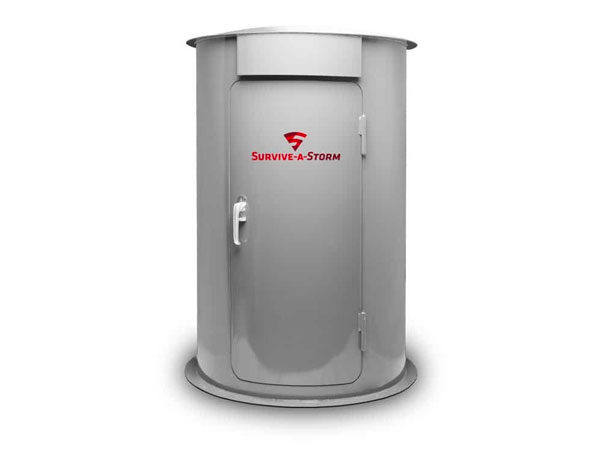
TwisterPod
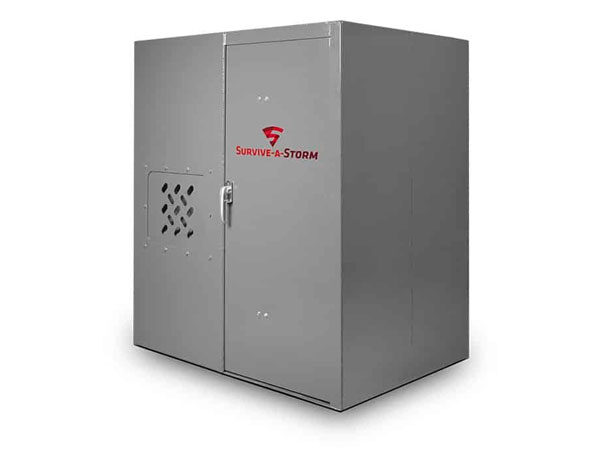
Extreme
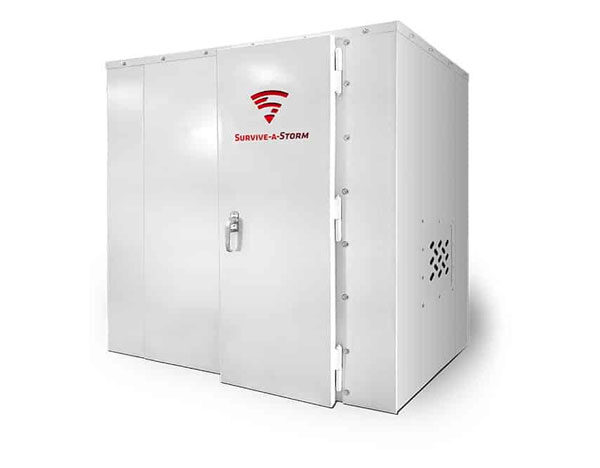
Panelized
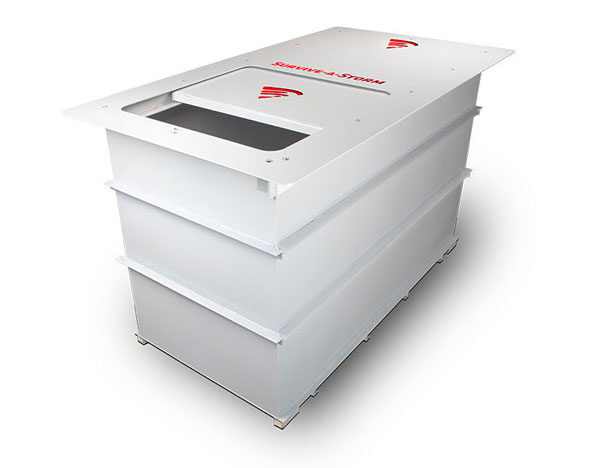
GarageCube
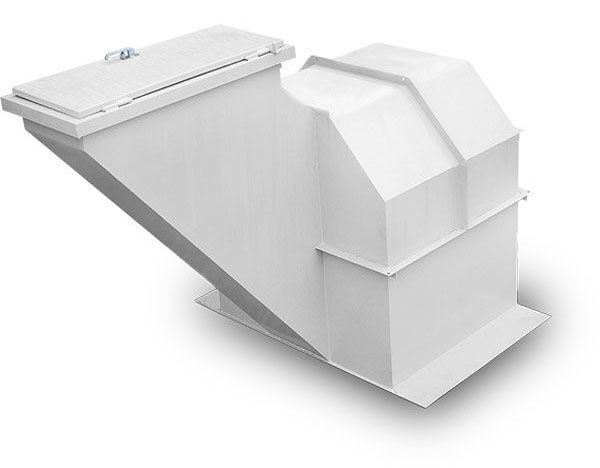
Estate
Delivery and Installation Options for Above-Ground and Below-Ground Tornado Shelters
Tornadoes are devastating and unpredictable natural disasters that can cause extensive damage to homes and properties. One of the best ways to stay safe during a tornado is to have a tornado shelter. Tornado shelters come in different types, with above-ground and below-ground tornado shelters being the most common.
We offer delivery and installation in various regions of the U.S. but if you prefer to conduct the installation yourself or our outside our installation area, here are some of the steps you will need to take.
For above-ground shelters, it's important to note that the concrete slab is not included in the package.
As for below-ground shelters, they are delivered on a standard truck with a flatbed.

Know when severe weather is about to strike and when it's time for you to take shelter with our StormWarn texting program.

Above-Ground Tornado Shelter Installation
- Finding a Local Contractor for Installation
Search for local contractors in your area, who will need to be hired to pour the slab. Look for contractors with high-rating reviews. - Selecting Contractors
Find a couple of companies in the search results to inquire about installation. - Calling a Contractor for Installation
Call a contractor and ask them for a quote on installing an above-ground tornado shelter.The installation process can be performed by anyone who is competent in drilling (concrete company, concrete installer, contractor) into concrete can install. We have a built-in template in all of our shelters that shows exactly where to predrill and sink wedge bolts. All hardware and instructions are shipped with the shelter. We will even speak with any general contractor to make sure they understand what the job requires.
The concrete slab should be at least 4" thick with a minimum psi of 3000. No wire mesh is required, but the pad size should be a minimum of 14' x 12' for a 4" thick slab, or 12' x 10' for a 6" thick slab.
You can download the installation instructions for the tornado shelter: TwisterPod, Extreme, Panelized.
- Preparing for Installation
Survive-A-Storm will have a third-party shipper deliver the shelter to your location and offload it at the end of your driveway. Your installation time can depend on a few factors that include, temperature and humidity that can affect the cure time for the concrete. Pouring the concrete for above ground shelter installation is your responsibility and should be allowed to cure for two weeks. Installation time after the concrete is poured should be less than four hours.Rent equipment like pallet jacks, forklifts, or small tractors with forks to maneuver the shelter to your desired location. If you can arrange for an installation to be done on the same day, your contractor may be able to move the shelter for you.
Below-Ground Tornado Shelter Delivery and Installation
- Finding a Local Contractor for Installation
Search for local septic tank companies or general contractors with high-rating reviews to perform the installation. - Selecting Contractors
Find a couple of companies in the search results to inquire about installation. - Calling a Contractor for Installation
Call a contractor and ask them for a quote on installing an above-ground tornado shelter. You can download the installation instructions for the tornado shelter: GarageCube.
Let the contractor or company know that the shelter should be buried at least 12" below the surface. - Preparing for Installation
In case you are outside the installation range, Survive-A-Storm will have a third-party shipper deliver the shelter to your location and offload it at the end of your driveway.By understanding the delivery and installation options for above-ground and below-ground tornado shelters, you can ensure that your shelter is installed correctly and provides the protection you need during a tornado.
Survive-A-Storm Shelters offers near-absolute protection with a full line of above-ground and below-ground storm shelters. Survive-A-Storm Shelters are FEMA-compliant and able to withstand winds and debris from any EF5 tornado.
With affordable pricing, nearly anyone can afford one. There's also financing through Enhancify and Affinity, making storm shelter loans very accessible to our customers.
You can buy a storm shelter locally, through select Home Depot Stores, or the Extreme brand at Lowe's. Amazon and e-Bay are also great online options for purchasing Survive-A-Storm Shelters.
Tornado Shelters in St. Louis, Missouri
When seeking safe shelter during a tornado in St. Louis, Missouri, it's important to know your options and have a plan. Below is a list of resources and available shelters in the area. Please note that while we strive to provide accurate and up-to-date information, we cannot guarantee the completeness or accuracy of these details. Contact local emergency management offices directly for the most current and accurate information.
Local Resources:
City of St. Louis Emergency Management Agency
- Address: 1915 Olive Street, Sixth Floor, St. Louis, MO 63103
- Phone: 314-622-3549
- City of St. Louis EMA
Missouri State Emergency Management Agency
- Phone: 573-526-9100
- Missouri SEMA - Contact Us
Safety Tips:
- Develop a tornado emergency plan that includes a designated safe room or shelter.
- Always have an emergency kit prepared with essential items like water, first aid supplies, and flashlights.
- Monitor local weather alerts via smartphone apps, radio, or TV.
Stay informed and safe!

